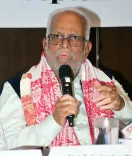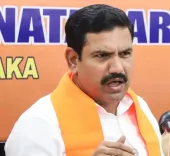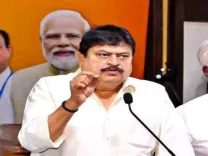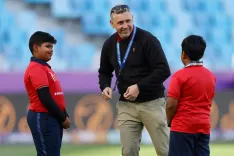M.K. Stalin: Love Politics Triumphs Over Hate Politics

Synopsis
Key Takeaways
- Politics of love is more effective than hate.
- Commitment to social justice and equality.
- Focus on eliminating caste discrimination.
- Welfare schemes for SC and ST communities.
- Advocacy for collective social and legal action.
Chennai, April 14 (NationPress) The Chief Minister of Tamil Nadu, M.K. Stalin, articulated on Monday that the “politics of love” serves as a more powerful and impactful force compared to hate-driven politics in the quest for an egalitarian society devoid of caste discrimination.
During the Equality Address commemorating the birth anniversary of B.R. Ambedkar at Kalaivanar Arangam in Chennai, M.K. Stalin affirmed that the DMK administration remains committed to the principles laid out by social reformers like Periyar and Ambedkar to foster social justice and equality.
“Caste is the primary element that fractures Tamil society. We are determined to eliminate this millennia-old issue. Our aim is to cultivate an understanding that we are all Tamils, transcending caste and creed,” M.K. Stalin stated at the event organized by the State Adi Dravidar Welfare Department.
Emphasizing various welfare programs implemented by the DMK government for Scheduled Caste (SC) and Scheduled Tribe (ST) communities, the Chief Minister remarked, “The progressive and rational principles that guide us should reach each individual. I strongly believe that the politics of love is more potent and effective than politics rooted in hate.”
Reaffirming the cohesive strength of Tamil identity, the Chief Minister expressed: “Challenges may emerge, or be intentionally created. We must, like Periyar and Ambedkar, confront them with awareness and resolve. Recognizing our adversaries and their narratives will simplify dismantling these barriers.”
In a subtle critique of those questioning whether Tamil Nadu remains a land of Periyar and Ambedkar, the Chief Minister noted: “Those who shed crocodile tears and highlight isolated regressive incidents are not genuinely concerned about the ongoing instances of such atrocities. Their remarks are rooted in arrogance and a wish to reestablish backward, conservative ideologies in a region where progressive change has taken hold.”
He called upon the populace to amplify their efforts—both socially and legally—to eradicate the remnants of discrimination in society.
“Let us persist in following the path charted by visionaries like Periyar and Ambedkar. Through our actions and dedication, we can progress toward genuine equality,” he stated.
The Chief Minister contended that no other administration has enacted as many welfare initiatives or allocated as much funding for the advancement of SC and ST communities as the current DMK government under its ‘Dravidian Model’ of governance.
“We have fostered social, educational, and economic development among the marginalized communities, including nurturing entrepreneurs from within these groups,” he asserted.
Earlier in the day, Chief Minister Stalin, along with his son and Minister Udhayanidhi Stalin, and Viduthalai Chiruthaigal Katchi (VCK) leader Thol. Thirumavalavan MP, paid floral tributes at the memorial of Ambedkar in R.A. Puram, Chennai.







